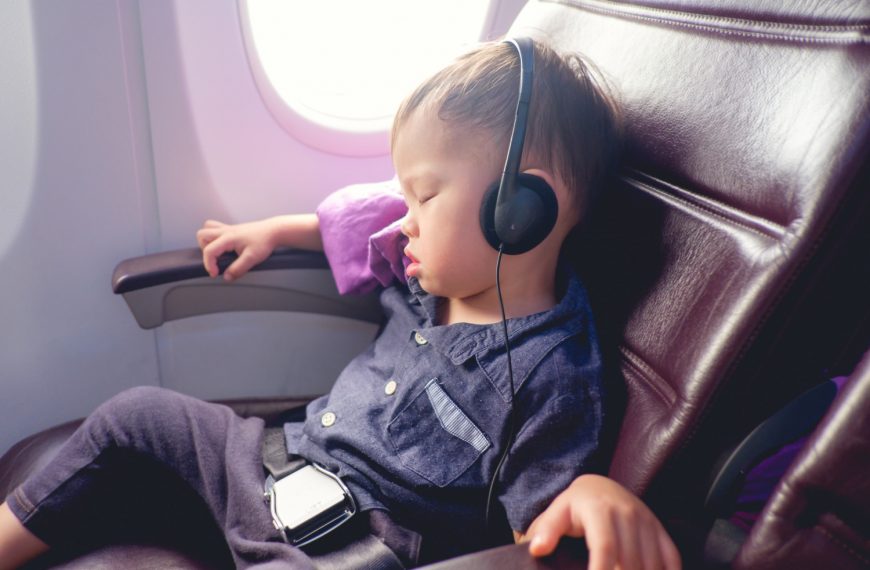It can be difficult to fly with a newborn, especially when it comes to dealing with earache and discomfort during takeoff and landing. It’s important to comprehend why babies get earaches when they fly. The good news is that there are several steps you can take to ease this discomfort and improve the experience for your child. Let’s look at 12 suggestions for keeping newborns’ ears comfortable when flying.
What Affects Babies and Toddlers’ Ear Pain During Flight?
When cabin pressure changes during air travel, just like it does for adults, babies’ ears may experience discomfort. Our ears’ ability to adjust to these pressure changes is provided by the Eustachian tubes, which connect the middle ear to the back of the nose and throat. During takeoff and landing, we might feel pressure or pain in our ears, which we could ease with a swallow or yawn.
Due to their thinner Eustachian tubes, babies and toddlers have a harder time balancing their ear pressure. As a result, in comparison to adults, kids could feel more pain and discomfort. Additionally, it can be difficult to get a wailing infant or a boisterous toddler to swallow on order.
Here are 12 Tips to Prevent Ear Discomfort in Babies During Air Travel
- Breastfeeding:
- Pacifier:
- Suckling or Drinking Anything:
- Vacuum Effect:
- Offer Food:
- Something Yummy:
- Chewing Gum:
- Wait with the Feeding:
- Drink Plenty of Water for Your Child:
- Colds or Allergies:
- Infant Pain Reliever for Sick Baby:
- Ask Flight Attendants for Help:
During takeoff and landing, breastfeeding or bottle-feeding your infant can be quite useful in reducing ear discomfort. Pressure in the ears is balanced by the motion of sucking and swallowing. If you plan to breastfeed while your baby is in an infant safety belt, make sure you and your baby are both comfortable with it by practising in public first.
Using a dummy can offer equal comfort to breastfeeding (80 words). The act of sucking on a dummy helps your baby feel less pain by balancing out the pressure in their ears. Try introducing a dummy to your infant if they aren’t used to using one before the flight, and make sure it is clean and sterilised.
If your baby is old enough to use a cup to drink, encourage them to suckle or drink something throughout takeoff and landing (80 words). The process of swallowing might help the ear pressure to balance. If your kid prefers it, you can even let them suck on your clean finger.
Gently put your palms between your infant’s ears to produce a light vacuum, and then rapidly release them. The pressure in their ears may be balanced with the use of this method. First, test this technique on yourself to make sure you’re using the right amount of pressure. It can be especially beneficial for infants who have trouble sucking on pacifiers or swallowing.
Give soft fruits or crackers during takeoff and landing to older babies and toddlers who have begun eating solid meals. These meals can ease the discomfort brought on by pressure fluctuations by being chewed and swallowed. To avoid any choking concerns, make sure the snacks are age-appropriate and simple to chew.
Lollipops can be a tasty reward that encourages swallowing and relieves ear pressure if your child is old enough and has had exposure to sugar. Choose small-sized, low-sugar lollipops whenever possible. The introduction of candy for the sole purpose of flying is not advised, and moderation should be practised.
Children above the age of three who can safely chew gum may do so during the flight. Gum chewing encourages swallowing and salivation, which helps to balance ear pressure. To prevent choking, make sure the gum is age-appropriate and watch your child closely.
Avoid starting any feeding too soon before the flight. Delays can happen, and if your infant or toddler is already stuffed, they might not be as likely to swallow when they need to. To make sure the timing is correct, start feeding just as the plane begins to roll for takeoff.
Because the air in aeroplanes tends to be dry and might irritate the nasal passages, staying well hydrated, including proper hydration for toddlers, is crucial while flying. Ear pain may become worse as a result of congestion. On the plane, make sure your child gets enough water or formula. To keep older kids hydrated, urge them to take regular sips of water.
Before the flight, check with your child’s paediatrician whether they have a cold or allergies. For safe antihistamines or decongestants to help with nasal congestion and lessen ear pain throughout the trip, they might provide a recommendation. It’s important to strictly adhere to your paediatrician’s recommendations and dosage guidelines. If decongestants are not available, a few drops of breast milk can be used to lubricate your baby’s nostrils.
If your child has a cold or ear infection that is real, talk to your paediatrician about giving them an infant pain reliever before taking off. Depending on your baby’s age and medical situation, they can advise you on the right medication and dose.
The seasoned individuals who work as flight attendants frequently deal with young children and newborns. Don’t be afraid to speak to them and seek advice or help in easing your child’s ear pain. They might have further advice or methods that have worked in the past.
By using these 12 suggestions, you can considerably lessen your baby’s ear discomfort when flying. Since every child is different, it’s crucial to figure out what suits your child the best. You may improve the flying experience for you and your infant by being well-prepared, patient, and compassionate. Travel safely! We encourage you to visit Eurokids for more information about children. Learn about a world where children receive compassionate care and excellent education.
















